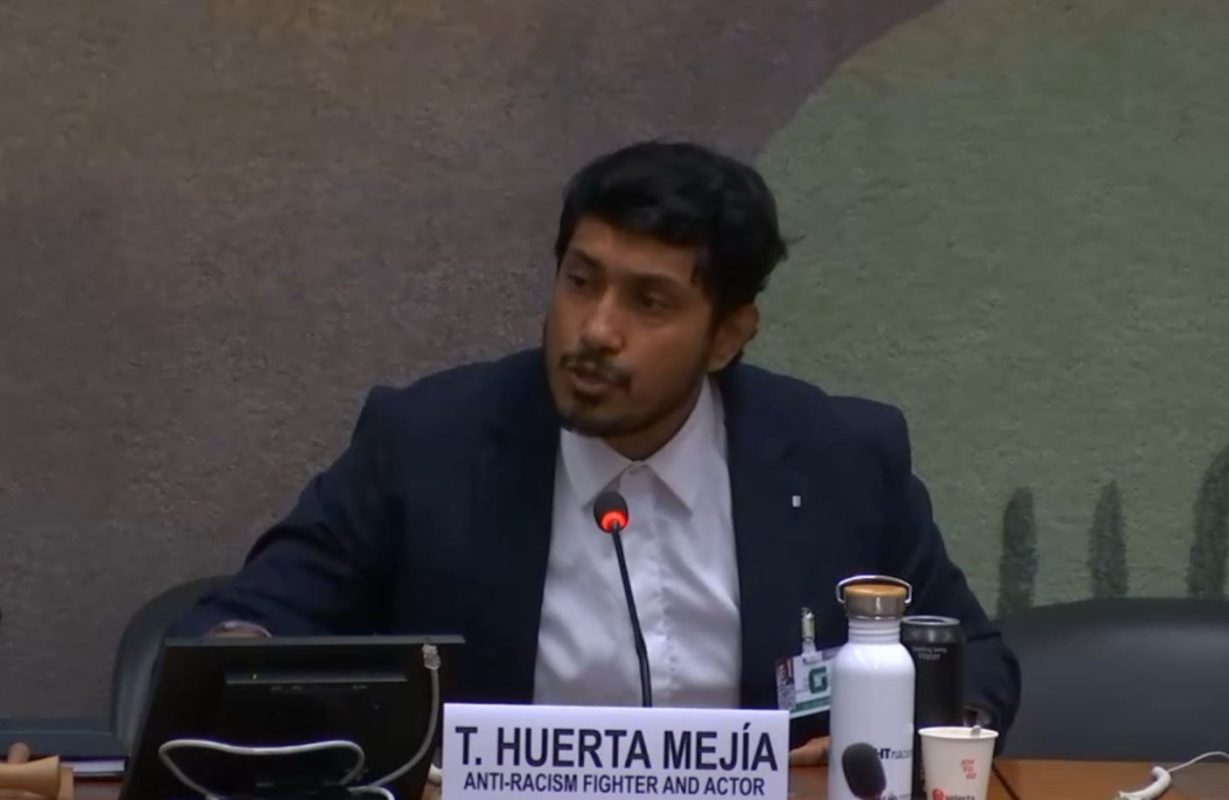‘Black Panther’s Tenoch Huerta Gets the Final Word on ‘Forced Inclusion’ Accusations at the United Nations
An analogy of biblical proportions.

While Tenoch Huerta is primarily known for his acting, the Black Panther star began his professional life speaking out about advocating for everyday people. Going to school for journalism, Huerta’s first decision was never film/TV because very few people in Mexican media looked like him. Well, unless they were playing one-dimensional characters. Between his early reporting and dabbling in acting, Huerta started to become a vocal advocate against racism and other overlapping injustices. That antiracist work only grew after Sarah Halley Finn and Ryan Coogler cast Huerta as Namor, King of Talokan, giving him a bigger microphone. This prompted an invitation to the United Nations (UN) panel at Human Rights Council.
On March 24, the Antiracism Working Group within the UN hosted a discussion between Huerta and Chief Interpreter Marie Diur with an introduction by Oscar Bielma (Third Human Rights Secretary). This event was part of a larger program at the UN recognizing the 75th anniversary of the Universal Declaration of Human Rights—a committee that, per Diur, wouldn’t have been possible before the summer of 2020. According to the moderator, Diur, the Black Lives Matter movement’s rippingly effects across the world pressured the UN to recognize its own perpetuation of racism.
In the conversation, Huerta talked about the privilege afforded to him as an actor to continue these discussions and reflections on antiracism advocacy. He says his power as an individual is to recognize these issues and work on fixing them without guilt. This extends beyond race and ethnicity, but also class, sexuality, and gender (as it relates to the idea of machismo). The conversation about racism was not limited solely to the three largest racial groups of Mexico—Europeans, Africans, and Indigenous communities. Huerta talked about Mexico’s massacre of Chinese Mexicans in 1911 and decades of deportation after.
The pushback against so-called “forced inclusion”
At one point in the discussion, Huerta addresses the concept of “forced inclusion,” and that part of the conversation went viral. Matthew Wilson (Ambassador of Barbados) asked how Huerta thinks ambassadors can push for reparations.
Tenoch said a major roadblock was people not “using the same measurement to analyze the same phenomenon.” He reminded the room that the U.K. wasn’t paid up on reparations for white slavers until 2015. Yes. The British government hadn’t paid off the loan it took from banks to pay white slave owners until eight years ago! Anyway, Tenoch added this unfair judgment towards reparations for Black people versus white enslavers feels similar to the pushback towards inclusion in media. When it’s for more representation of white people (especially men), it is fine. But when it is anyone else, there’s fierce resistance. Tenoch continued:
I ask myself, okay. 2,000 years ago a Palestine guy—a black guy—made a revolution with love and peace and everything in the Middle East. Then, they crucify him, and now [he] is the God of half of the world, right?
Jesus Christ, he was black. Then, the Europeans need inclusion so they paint him white. That is the strongest forced inclusion ever! They made a black God— they made it white!
Oh, but the people [are] complaining “Oh, the Little Mermaid is Black!” Grow up man. You are 40 years old. You’re childhod is not ruined. Your adulthood is ruined because you are an asshole.
The white-washed version of Christianity was projected to the world and used to justify slavery and genocide. It later morphed into White Saviorism and José Vasconcelos’s “mejorar la raza” living on. This was real harm that is still felt today across the world—including Mexico and the United States. The same can’t be for Halle Bailey’s casting of The Little Mermaid. However, some people complain that a single instance of Black Ariel (and I wish I was joking) is “white genocide” and “gingercide.” These same people ignore that more marginalized people aren’t asking for payback. Also, Black people can be naturally red-headed (and blonde!).
Tenoch brown/black experiences
In addition to recognizing the difference between religion (Judaism) and nationality (Palestinian), please note that “Black” and “brown” are used differently in Huerta’s primary language, Spanish. Earlier in the conversation, Duir asked about his use of the word “Black” interchangeably with “brown.” Huerta noted that this comes from his work with the acting collective Poder Prieto. “Prieto” can be Black, brown, or dark, there’s no one-to-one in English. Created by Maya Zapata, the group of artists fights against discrimination in Mexico.
Additionally, within the discussion, Huerta touched on his own moment of realizing how insidious racism was and how he contributes. He discussed how his (then-six-year-old) niece was bullied with the name “la Negra” (little Black girl.) He then reflected on how his familial nickname of “Negrito” (little Black boy). How it could be weaponized and be made a term of endearment depending on use.
There were many things, an accumulation of experiences, of knowledge, of reflections […] It is a painful process to realize that you not only received violence but that you exercised it. In my case, it has been more painful to recognize that I have exercised it than that I have received it.
State-side, most of the bigotry slung at Tenoch came in the form of fat-shaming. And, of course, people fuming that Namor wasn’t an Asian-coded white man like in the comics. However, the pushback in Spanish-speaking media and Latin American media was about how dark Huerta was. The colorism towards Huerta in Spanish-speaking media worsen when they realized he had a history of fighting back. That didn’t stop Huerta from publishing his book Orgullo prieto (Black Pride). The novel documents the racist structures in Mexico alongside personal narratives.
CORRECTION 3/28/2023: Updated to correctly translate “Poder Prieto.” “Poder” means power.
(via @BrinkofCatness on Twitter, featured image: screencap)
The Mary Sue may earn an affiliate commission on products and services purchased through links.
Have a tip we should know? tips@themarysue.com